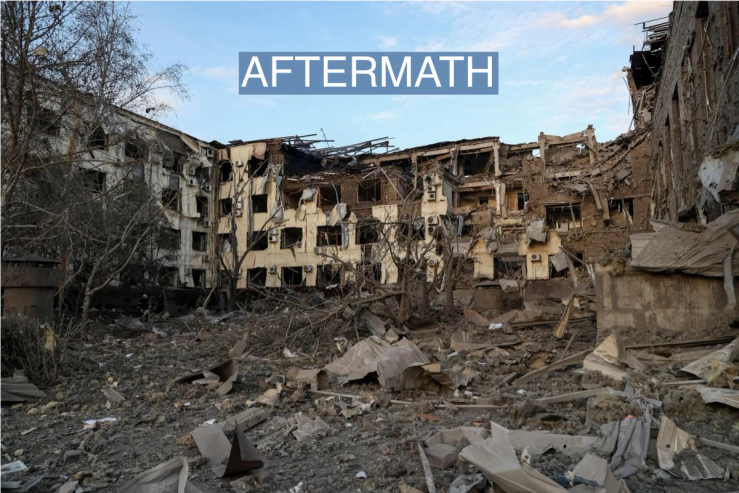The News
As Ukrainian forces prepared for their crucial counteroffensive against the Russians, Sergiy Tsivkach arrived in Washington with another mission earlier this month: rebuilding Ukraine after the war ends.
Tsivkach, who is the CEO of UkraineInvest, a government body tasked with attracting foreign direct investment, spent a few days in the area meeting with Biden administration officials and business groups like the National Association of Manufacturers at a Commerce Department conference. He also huddled with prospective investors at a law firm.
“There is a good deal of interest, but everyone is cautious about the war,” Tsivkach told Semafor in a phone interview late last week before heading home. “Everyone also understands there will be an end to the war, there will be Ukrainian victory, and there will be a very profitable place to make business in Ukraine.”
The World Bank has placed the cost of rebuilding Ukraine at $411 billion over a decade. Estimates from Ukrainian leaders range from $750 billion to over $1 trillion.
“This will be the biggest reconstruction project anywhere in the world,” Isobel Coleman, deputy administrator at the U.S. Agency for International Development, told Semafor in an interview.
Ukraine’s economy has taken a beating during the war; its gross domestic product shrank by over 30% last year. Important infrastructure, like hospitals, schools, and roads — even entire cities — have been destroyed by Russian strikes.
In some ways, the reconstruction process has already begun, Coleman noted, including repairs to Ukraine’s energy grid after a barrage of Russian attacks over the winter that interrupted power. Ukraine’s short-term needs are being fueled in part by U.S. dollars appropriated by Congress.
Officials say that the longer term post-war reconstruction effort will involve both investments from private sector businesses and multilateral institutions like the IMF and World Bank. “We’re not looking to Congress to fund Ukraine’s reconstruction,” Coleman said.
The international community has also coalesced behind the idea of somehow using seized Russian funds to help back the reconstruction of the war-tattered country, though officials are still examining the legality of using frozen Russian assets to supplement the rebuilding process.
“We’ve been very clear that Russia will need to pay for the damage that it has caused. I think the exact mechanism for that is still something that we are working through,” a senior Biden administration official told Semafor.
Morgan’s view
Figuring out how to rebuild a country in the middle of a war that has no clear sign of an end is really tricky business — especially when it comes to determining how to pay for it.
That said, I was struck by how optimistic everyone I spoke to for this story came across, especially about the private sector’s appetite to invest in Ukraine. There are some limited signs of this already, like planned investments from Nestle and the Irish manufacturer Kingspan.
President Volodymyr Zelenskyy just met with executives from BlackRock, which has agreed to advise Ukraine’s government on a new development fund that will attract public and private capital for reconstruction projects after the war ends.
Coleman argued that Ukraine is an attractive investment opportunity, given the cost of doing business and the country’s highly skilled workforce.
“There is a lot of interest in getting involved in post-war reconstruction in Ukraine … both from a sense of the international importance and a sense of wanting to be a part of the broader effort, but I think also from a self-interested perspective,” the senior Biden administration official told me.
In Washington, conversations seem to be picking up steam. The U.S. Chamber of Commerce formally launched a Ukraine business initiative to spur conversations between the Biden administration and the private sector about how to incentivize U.S. businesses to invest in Ukraine and ensure they have a fair shot.
Marjorie Chorlins, the chamber’s senior vice president for Europe, told me recently that the organization is considering sending a delegation to Kyiv in late spring or early summer potentially with U.S. government officials, though it will be dependent on security.
Room for Disagreement
Ukraine still faces major challenges in attracting investments, both from the war itself as well as ongoing concerns about corruption.
“There are very real concerns about the security situation and also about the overall business environment in terms of respect for rule of law, contract sanctity, effective governance structures and things like that,” Chorlins said.
Tsivkach said Ukraine has the right institutions in place to combat corruption and pointed to recent instances of senior officials losing their jobs as evidence that Zelenskyy takes the issue seriously. He also pointed to political risk insurance as a way to help ease concerns among investors about putting money into a country in the midst of war.
The View From Russia
Ukraine and its allies abroad aren’t the only ones talking about reconstruction projects. After rendering the city of Mariupol virtually uninhabitable through siege warfare, Russia is trying to rapidly rebuild sections of it in order to portray it as a model assimilated community, BBC News reports.
Notable
- Italy hosted a bilateral conference on Ukraine reconstruction in late April during which Prime Minister Giorgia Meloni urged the EU to accelerate Kyiv’s membership bid, according to the Associated Press.
- Some Ukrainian officials are trying to manage expectations of the impending counteroffensive, the Washington Post reports.


